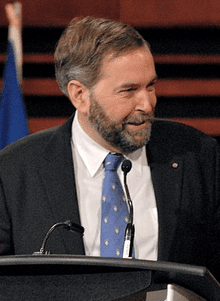


Ottawa, ON, Canada—Last year, Jack Layton, the leader of Canada’s Official Opposition passed away suddenly after a bout with cancer. Jack Layton was a staunch friend of Canada’s Sikh community, speaking out fearlessly against the attack on Harmandir Sahib in Amritsar in 1984. Jack Layton was also a courageous defender of the kirpan and other articles of the Sikh faith. Earlier this year, Thomas Mulcair was chosen to succeed Jack Layton as the leader of Canada’s New Democratic Party (NDP) and also as the leader of Canada’s official opposition. Canada’s Sikh community was not too familiar with Thomas Mulcair although they were relieved when Mr. Mulcair recently released a statement on June 4 in solidarity with Canadian Sikhs against the atrocities committed by the Indian government.
On the 28th anniversary of the attack on the Harmandir Sahib, the following statement was issued by the NDP leader on NDP.ca website –
It is with great sorrow that I extend my sympathies on the 28th anniversary of the invasion of the Darbar Sahib complex, also known as the Golden Temple, and dozens of Gurduaras in Punjab, India.
The tragic events that unfolded over the course of those sweltering days in June, and the subsequent killings in November, have deeply hurt the Sikh community, both in India and abroad.
Like our former leader Jack Layton, I firmly stand in solidarity with the community, independent human rights organizations and Canadians across the country, in seeking justice. When innocent lives are lost with no accountability or explanation by the government, we have an obligation, as one democratic nation to another, to ask why and seek honest answers on behalf of our citizens.
As we remember June 1984, I remind Canadians that remembrance is the tie that binds us to our past as it guides us through the challenges of the future.
Source: NDP.ca
As many Sikhs expected, Indian government officials in Canada have launched a public campaign to bully Mr. Mulcair to disavow his support for the human rights and dignity of Sikhs in Punjab. Shashishekhar Gavai, India’s High Commissioner to Canada was quick to complain about the press note by Tom Mulcair. According to Mr. Gavai’s complaint, the attack on the Harmandir Sahib was carried out to “neutralize terrorists who had taken control of the Temple”. In addition, he used the word “riots” to describe the anti-Sikh pogroms that took place after Indira Gandhi’s assassination.
It should be noted that the Government organized attack on the Harmandir Sahib claimed lives of tens of thousands of Sikhs, mostly pilgrims who had gathered to observe the martyrdom of their fifth Guru, Guru Arjun Dev Ji. Apart from civilian killings, the Army troops had attacked 38 other Sikh places of worship in 1984.
Regarding the “anti-Sikh Pogroms” statement, the events that took place are considered pogroms by humanitarian organizations rather than “riots.” Those carrying out pogroms were seen with voter registration lists to identify Sikh houses, and were provided with supplies of iron rods and kerosene which were used to injure and kill thousands of Sikhs. Further, many senior Government leaders played a role in instigating these pogroms. The role of Sajjan Kuman, Jagdish Tytler and H.K.L Bhagat, three Senior Congress leaders, is well documented. Amnesty International and the United States Department of State has continuously listed India as having violated human rights of its citizens and the 1984 anti-Sikh pogroms are a prime example of those violations.
In 2010, Canadian visa officers acted independently to deny visas for members of Indian security forces who were implicated in human rights abuses. After outrage from the Indian government, the Canadian government backed down immediately. Canada’s national newspaper, the Globe and Mail described Canada as “chastened and apologetic” when pressured by the Indian government on the issue of visas for human rights violators. Canada’s government has been happy to look the other way with regards to Indian human rights abuses in order to maintain hopes for a free trade deal with India. Fortunately, Canada has an official opposition with a leader who values human rights for all over trade.




